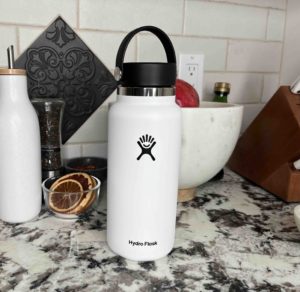Here we go again, another study telling us what we already know: you have to wash your reusable water bottles. Guys, it should not surprise anyone to hear that if you don’t wash your bottles, they will have gross germs on them. It’s ok if you didn’t realize that, or if you forgot. We’re reminding you now.
Here’s the thing. You carry your reusable water bottle around all day, and you use your hands to do so. Whatever ick is on our hands ends up—gasp!—on our bottle.
Knowing this, or maybe because of this, some researchers at Purdue decided to check out some water bottles under a microscope. The team collected 90 bottles from students and asked them some questions about how they clean their bottles. The study’s goal was to answer the question: How clean are the bottles that students use all day?
Then the researchers got to work. They used a test called ATP, which is a swab test used in food safety. It lights up on a positive result for organic residue.
Then, they rinsed out the inside of the bottles to check out any bacteria stuck to the surfaces. Water-loving bacteria was counted and checked for coliforms, which can signal when conditions could support even more gross contamination.
So…what did they find. Well, gross things, of course! Every water bottle they tested—plus two brand new ones they wanted to use as control bottles—failed the ATP swab test for the exterior of the bottles. Not surprisingly, the bottles that were filled more often were dirtiest.
Ok, well what about the inside? The standard for drinking water is 100-500 CFU/mL. In this study, 7 out of 10 bottles were over 100, about 2 out of 3 were over 200, and 3 out of 5 were more than 500. They also checked for coliforms
Researchers also checked for coliforms (or fecal matter). The standard for bottled water is no more than 1 per 100 mL. In this study, 1 in 4 was greater than this, and a few were way above.
So what can us reusable water bottle-loving people do? WASH YOUR BOTTLES!
Use hot water and dish soap, scrub it with a bottle brush. Separate out all the gaskets and parts (like straws, valves, and silicone rings) and wash them too. Then, let it all dry out.
Studies like this are such a good reminder that hygiene is still important in our lives and provides concrete, scientific evidence as to why we all need to wash our reusable water bottles.

